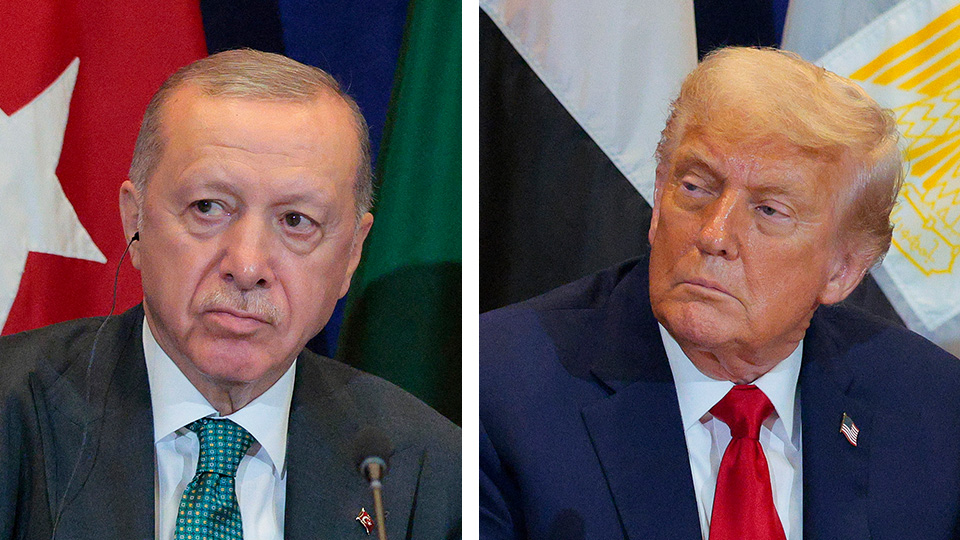Erdogan Visits Trump White House With $50 Billion Shopping List
(Bloomberg) -- Turkish President Recep Tayyip Erdogan is set to visit the White House for the first time in six years, bringing a slate of deals aimed at repairing the fractious ties between the two members of the North Atlantic Treaty Organization.
Thursday’s meeting with President Donald Trump is expected to clear the path for Turkey to buy everything from Lockheed Martin Corp. fighter jets and Boeing Co. planes to liquefied natural gas worth more than $50 billion, according to Turkish officials, who asked not to be identified as the agreements haven’t been finalized.

Erdogan sees the meeting as a chance to reset ties that have been shaken by its purchases of Russian arms, diplomatic spats and retaliatory tariffs. Turkey still depends on US military and diplomatic backing to maintain regional clout, and investors see its role in a Western alliance as critical for the development of the Middle East’s largest economy. Expectations of a thaw with Washington boosted Turkish markets, with government debt and stocks rising since Trump announced the White House visit last week.
“Erdogan wants to leverage the Trump presidency to reshape and improve Turkey-US relations, with a focus on improving defense ties,” said Emre Peker, the London-based Eurasia Group Europe director. “The energy and defense deals Erdogan is pursuing are key pillars of a mutually beneficial, transactional relationship that would also appeal to Trump’s dealmaking instincts.”
The two leaders have come a long way since their uneasy White House meeting in November 2019. After Trump pledged earlier that year to pull troops from Syria, Turkey launched a military incursion against US-backed Kurdish forces, prompting Washington to sanction several Turkish cabinet ministers.
The alliance narrowly avoided collapse when then–Vice President Mike Pence brokered a pause in the fighting, allowing American-backed forces to move away from the Turkish line of fire.
Six years on, including a full Democratic presidency during which Turkey was hardly a priority for Washington, Erdogan and Trump both stand to gain from an upgrade in ties. Turkey is eager to meet some of its military and energy needs from the US, offering Trump an easy trade-deal win.

For Ankara, the upside is just as clear. Erdogan wants to underscore his commitment to Turkey’s place in the Western alliance after his reelection two years ago. He has already reassured international investors by abandoning his unorthodox economic policies and naming former Merrill Lynch strategist Mehmet Simsek as finance minister.
But cultivating a close relationship with the White House is key to shoring up confidence in Turkish markets until inflation — now above 30% — is brought under control and the country rebuilds its foreign-exchange reserves to weather turbulence.
“Erdogan, who prioritizes remaining president, aims to avoid jeopardizing his career path with any problems stemming from the US or Trump until an election in 2028 or earlier,” said Nihat Ali Ozcan, a strategist with Ankara-based think-tank TEPAV.
The largest share of Thursday’s potential deals could be in aviation. Boeing and Lockheed Martin may see orders of as many as 250 commercial jets along with additional F-16 fighters, the Turkish officials said.
Trump said last week there was a chance to resolve the long-running logjam over F-35 stealth aircraft. Turkey was an original partner in developing Lockheed’s most advanced warplane but was ejected from the program after buying Russia’s S-400 air defense system. That purchase resulted in congressional sanctions, known as CAATSA, that targeted Turkey’s defense industry and still remain in place.

Ankara has refused to abandon the S-400s, as Washington demands, but hopes a compromise over their deployment could reopen the door to purchasing 40 F-35s, according to the Turkish officials.
On Wednesday, Turkey announced long-term agreements with Mercuria Energy Group Ltd and Woodside Energy Group Ltd to purchase around 76 billion cubic meters of natural gas in the form of LNG, mainly from plants in the US.
Gas shipments and defense deals would bolster bilateral trade, which both countries have said they want to triple to about $100 billion a year. Exports were roughly balanced in both directions, according to data by the International Monetary Fund, allowing Turkey to face only a 15% US tariffs on its goods, among the lowest rates Trump imposed on peers in August.
“Turkey signals a strategic pivot toward rebuilding trust, particularly after tensions over defense ties with Russia and divergent foreign policy positions,” said Umud Shokri, a senior foreign policy adviser at Middle East Institute, a think tank in Washington.
Still, the “delicate balancing act” between Russia and the West are risk factors creating uncertainties, he said.
Where the relationship goes next will have repercussions beyond Turkey’s borders, especially in Syria.
Turkey is counting on US help to engineer a deal between Kurdish fighters in Syria and forces loyal to President Ahmed al-Sharaa’s new government in Damascus.
Ankara has viewed Kurdish groups in Syria as an extension of the PKK, the insurgent organization it fought for more than four decades. The PKK is designated a terrorist group by the US and European Union, and recently agreed to lay down its arms.
But Turkish officials fear some PKK fighters may slip into Syria and continue to pose a threat from there, using US-supplied weapons originally meant for the fight against Islamic State.
Differences in regional policies, including Erdogan’s outspoken criticism of US-ally Israel, pose a threat to the reset Erdogan is seeking and “may not allow him to establish long-term stability in Turkish-US relations through economic concessions,” Ozcan said.
©2025 Bloomberg L.P.





